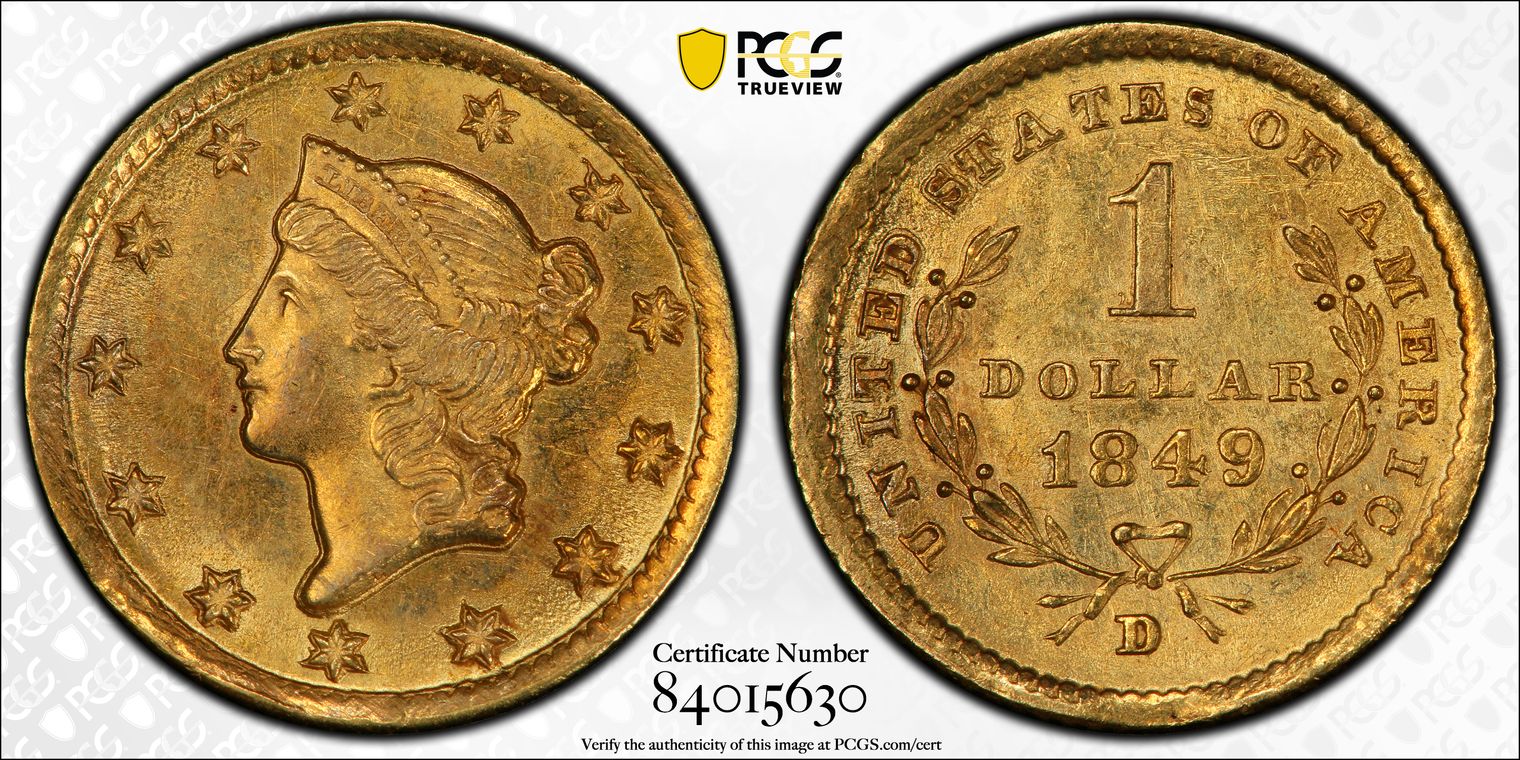1849-D G$1 MS62 认证号84015630, PCGS号7507
专家评论
David Hall
There is an uncertified monster Gem example that Doug Winter saw years ago. Doug feels the coin would grade an incredible MS67. We should probably put this coin in the condition census as an "Estimate grade" MS67 or MS66.David Akers (1975/88)
This is the only D Mint gold dollar that can be reasonably obtained in mint state. As is the case with most Charlotte and Dahlonega gold coins, the 1849-D is often softly struck on the hair, giving the appearance of wear even if there really is none.Doug Winter
The 1849-D is the most common gold dollar struck at the Dahlonega Mint. Like most first-year-of-issue coins, a number were saved as souvenirs. As a result, it is also the most available Dahlonega gold dollar in high grades.The 1849-D gold dollar is most often seen in Extremely Fine and the lower About Uncirculated grades. It becomes moderately scarce in the higher About Uncirculated grades. It is rare in Mint State but it is much more readily available in Uncirculated than any other Dahlonega gold dollar. The 1849-D is very rare in Mint State-62 and it is extremely rare in accurately graded Mint State-63.
STRIKE: The quality of strike is superior to the 1855-1861 issues as well as most other Type One Dahlonega gold dollars. The obverse has a distinctive unusual semi-concave appearance which looks much different from the reverse. The hair of Liberty typically shows good overall detail with weakness sometimes seen on the curls below LIBERTY. The stars are broad and sharp at their tips but are most often seen with weak details at the centers. The milling is flat from 4:00 to 8:00.
The reverse is often found with what appears to be poor centering and a resultant blurry look. The date is sometimes weak, as is the mintmark. It should be pointed out that a small number exist with sharper reverses (see below for more information).
SURFACES: 1849-D gold dollars tend to have better quality surfaces than other Dahlonega gold dollars from this era. It is common for examples to show light to medium marks in the fields. On some, there may be raised die lines in the fields or what appears to be light rust. Occasionally, light clashmarks can be seen at the center of the obverse.
LUSTER: This date is found with superior luster in comparison to other Type One Dahlonega gold dollars. Some have proof-like fields which change to a grainy texture towards the border. These have intense frosty luster with a well-defined texture.
COLOR: Original, uncleaned pieces have coloration which ranges from orange-gold to green-gold to medium coppery-gold. Many high grade examples have very distinctive coloration with medium hues in the fields changing to a deeper-hued inner ring at the border. This is one of the few Dahlonega gold dollars that can be found with some degree of frequency in its original state. But it is becoming harder to find 1849-D gold dollars that have not been cleaned or dipped.
EYE APPEAL: As a rule, this is among the nicer appearing Dahlonega gold dollars. The collector who wants a coin with superior eye appeal can probably locate a suitable 1849-D without a great effort.
PERSONAL OBSERVATIONS: At the 2001 American Numismatic Association convention held in Atlanta, an absolutely remarkable 1849-D was shown to me by an older gentleman. According to him, the coin had been in his family for at least seventy-five years. This coin, which I graded Mint State-66 to Mint State-67, had superb multi-hued coloration and was housed in an old manila envelope on which was hand written “1849-D Dollar, Brilliant Uncirculated Gem, $35.00.” I showed the coin to another dealer who was at my table and he agreed that it was the single most attractive Dahlonega gold coin that either of us had ever seen.
DIE VARIETIES: Two varieties are known. Both share the same obverse.
Variety 1-A: The reverse die appears slightly off center with the right edge of the mintmark below the far right knot of the bow. This was the first variety struck in 1849. According to existing records, the first 1849-D gold dollars received by Mint Director Robert Patterson were unsatisfactory due to a blurry reverse. Another existing letter, this from Dahlonega Mint Superintendent James F. Cooper, states that in early August, this problem had been corrected (i.e., another reverse die had been produced).
It is believed the 6,593 examples using this reverse were struck in July, 1849. Surprisingly, it is considerably more common than variety 1-B; probably due to the fact that many were saved as souvenirs.
Variety 1-B: The reverse die is well centered with the mintmark lower than on reverse A and father to the right so that it is fairly well centered under the bow knots. The quality of strike is much better on this reverse as is the centering. Die states are known with no cracks and with extensive cracks.
PCGS #
7507
设计师
James Barton Longacre
边缘
Reeded
直径
12.70 毫米
重量
1.70 克
铸币数量
21588
金属成分
90% Gold, 10% Copper
更高评级数量
25
评级较低的钱币数量
265
地区
The United States of America
价格指南
PCGS 数量报告
拍卖 - PCGS 评级的
拍卖 - NGC 评级的
稀有性和存量估计 了解更多
| 所有评级 | 300 |
| 60或以上 | 35 |
| 65或以上 | 3 |
| 所有评级 | R-6.4 |
| 60或以上 | R-8.8 |
| 65或以上 | R-9.8 |
| 所有评级 | 14 / 26 |
| 60或以上 | 12 / 26 |
| 65或以上 | 2 / 26 TIE |
| 所有评级 | 41 / 81 TIE |
| 60或以上 | 26 / 81 |
| 65或以上 | 6 / 81 TIE |
状况普查 了解更多
|
#1 MS67 estimated grade
Georgia Collection - reportedly seen by Doug Winter at the 2001 Atlanta ANA convention |
| #2 MS64 PCGS grade |
| #2 MS64 PCGS grade |
| #2 MS64 PCGS grade |
| #2 MS64 PCGS grade |




















